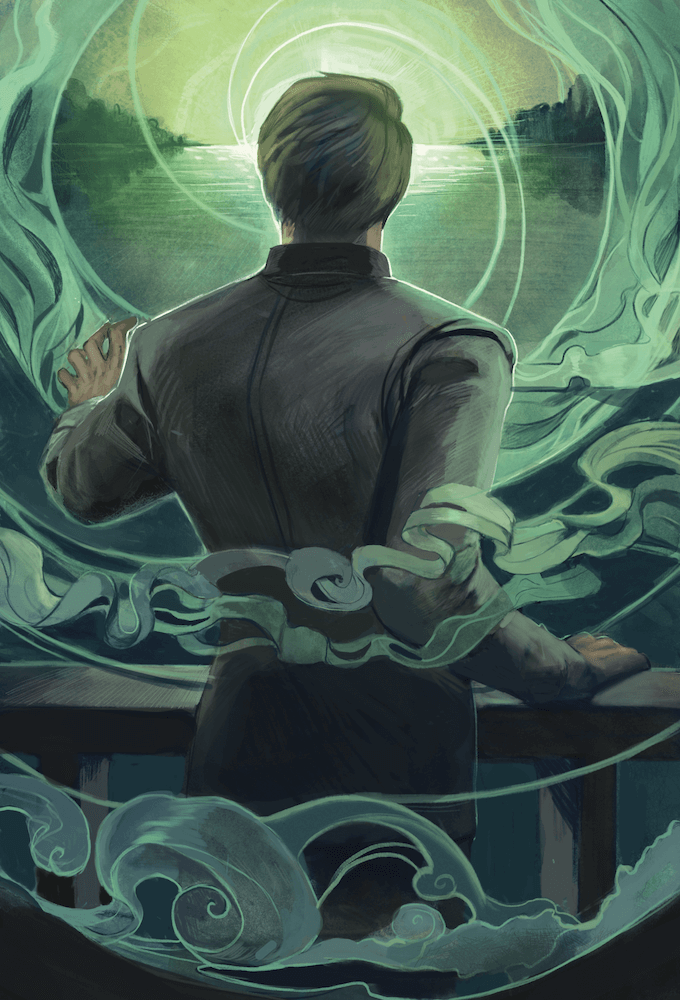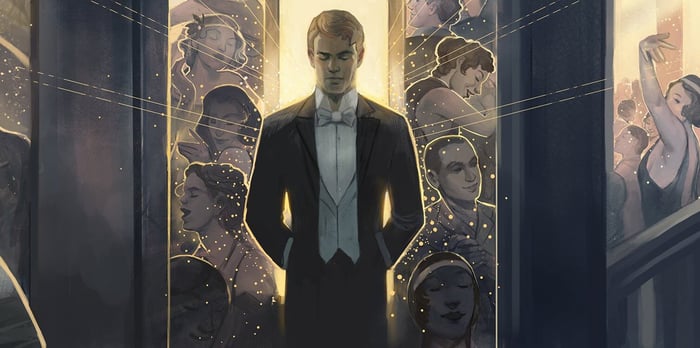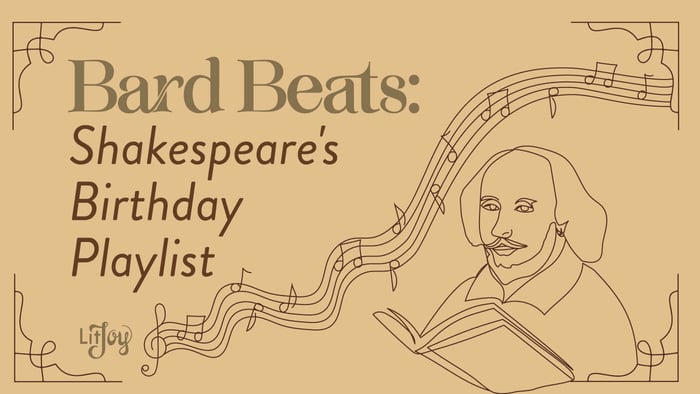
Celebrate 100 years with 16 Great Gatsby Quotes
Let's relive the lavish and exciting Roaring 20s with F. Scott Fitzgerald's The Great Gatsby. Fitzgerald's Jazz Age novel set in 1922 celebrates 100 years and we here at LitJoy are here for it! The novel that brilliantly juxtaposes the haughtiness of old money, the grotesque mass consumerism of the nouveau riche, and the seemingly impossible pursuit of the American Dream is rich with prose that still strikes a chord today. Below, find our 16 favorite Great Gatsby quotes found throughout this poignant and tragic novel.
"In my younger and more vulnerable years my father gave me some advice that I've been turning over in my mind ever since. 'Whenever you feel like criticizing anyone,' he told me, 'just remember that all the people in this world haven't had the advantages that you've had.'"
~Nick Caraway to the reader, Chapter 1, opening line. A beautiful opening line by Fitzgerald to set up the rest of Nick Carraway's tale of the juxtaposition of class and money and the quest for the American Dream. While it also sets up readers to trust Nick as a narrator, we later learn that he's reminding himself of this after the fact considering his initial thoughts about Gatsby that eventually change by the end.
“No—Gatsby turned out all right at the end..."
~Nick Carraway to readers, Chapter 1. Of course, by now, readers know that Jay Gatsby doesn't really "[turn] out all right at the end" so this quote has been a topic of debate for almost 100 years. Why does Carraway say Gatsby turns out all right? What does he mean? Perhaps it's because Nick's opinion of Gatsby changes from annoyance at his elaborate display of wealth to the realization that Gatsby is nothing like Tom and Daisy Buchanan—wanting to achieve the American Dream rather than the superficial and selfish ideals of wealth that the Buchanans represent.
"And I hope she'll be a fool—that's the best thing a girl can be in this world, a beautiful little fool."
~Daisy Buchanan to Nick Carraway, Chapter 1. This is one of our favorite Great Gatsby quotes because it's just so beautiful and poignant. This is Daisy Buchanan's way of showing her understanding that women are likely happier in life if they are ignorant of the harsh realities of the world. Daisy believes that if her daughter is a "fool" then she will grow up to be happy.
"—He stretched out his arms toward the dark water in a curious way, and, far as I was from him, I could have sworn he was trembling. Involuntarily I glanced seaward—and distinguished nothing except a single green light, minute and far away, that might have been at the end of a dock." |
 |
~Nick Carraway, Chapter 1. In this famous Great Gatsby quote, Nick has not yet met his neighbor, The Great Gatsby, but he can see that Gatsby believes himself to be alone with his thoughts and reaching toward something distinctly unreachable. Like Nick, we as readers do not yet realize that the green light is at the end of Daisy Buchanan's dock and what Gatsby is reaching for is the impossible representation of that light...Gatsby's American Dream to have the wealth and the girl.
“I was within and without, simultaneously enchanted and repelled by the inexhaustible variety of life.”
~Nick Carraway to readers while at Tom Buchanan's New York apartment with Myrtle Wilson, her sister and another couple, Chapter 2. Our narrator Nick finds himself attracted to the lavish and excessive lifestyle of the extremely rich while also appalled by their superficiality and immoral affairs. He is "within and without" realizing that he may be participating, but he isn't one of them.
"In his blue gardens men and girls came and went like moths among the whisperings and the champagne and the stars."
~Nick Carraway to readers, Chapter 3. People are attracted to Gatsby like moths to light. They don't love Jay Gatsby; they love the champagne, the gossip, to see and be seen.
"I like large parties. They’re so intimate. At small parties there isn’t any privacy"
~Jordan Baker to Nick Carraway, Chapter 3. At small parties, while they seem intimate, one cannot get away to have intimate conversations without being noticed. Miss Baker understands that it is much easier to have one's actions go unnoticed when many people are around to keep intimate discussions—well, intimate.
"You see I usually find myself among strangers because I drift here and there trying to forget the sad things that happened to me."
~Jay Gatsby to Nick Carraway, Chapter 4. Here the Great Gatsby hints to Nick that his upbringing was less than noble, that he had to reinvent himself at times to become who he is, and in reinventing himself he's had to lose so much to attain where he is.
"Possibly it had occurred to him that the colossal significance of that light had now vanished forever. Compared to the great distance that had separated him from Daisy it had seemed very near to her, almost touching her. It had seemed as close as a star to the moon. Now it was again a green light on a dock. His count of enchanted objects had diminished by one."
~Nick Carraway to readers, Chapter 5. It is in this moment that Nick understands the significance of the green light that Gatsby is reaching toward at the end of Chapter 1. This quote shows Nick's contemplation that now Gatsby must face the reality of Daisy Buchanan being by his side rather than the dream of her that he's carried for the last five years.
'“Can’t repeat the past?” he cried incredulously. “Why of course you can!”'
~Jay Gatsby to Nick Carraway discussing Daisy Buchanan, Chapter 6. Probably Gatsby's most famous quote aside from his catch-phrase "old sport" is this one he says to our narrator Nick Carraway, which shows Gatsby's disconnect from reality as he tries to pick and choose events from the past to recreate and fulfill his dreams of winning back the heart of Daisy Buchanan.
“His heart beat faster and faster as Daisy’s white face came up to his own. He knew that when he kissed this girl, and forever wed his unutterable visions to her perishable breath, his mind would never romp again like the mind of God. So he waited, listening for a moment longer to the tuning-fork that had been struck upon a star. Then he kissed her. At his lips’ touch she blossomed for him like a flower and the incarnation was complete.”
~Nick Carraway to readers, Chapter 6. Nick describes the moment of Jay and Daisy's first kiss five years before as it was told by Gatsby to Nick, showcasing one of the many quotes about Gatsby that illustrates his "appalling sentimentality" as Nick states.
 |
"Life starts all over again when it gets crisp in the fall."~Jordan Baker to Daisy Buchanan, Chapter 7. Miss Baker's response to the Daisy Buchanan quote: "What'll we do with ourselves this afternoon?...and the day after that, and the next thirty years?" is both a quote about the coming of fall and its colorful beauty, and ironic in the sense that the fall is actually a season when things are preparing to end, not start over. In this quote, Jordan Baker is also foreshadowing the fact that for the Buchanans, life will start over—just not in a way Daisy can be hopeful of. As we readers know, by the end of the novel, they will be done with the Gatsby narrative and their money and reputation will allow them to go on as if nothing has happened. |
“She hesitated. Her eyes fell on Jordan and me with a sort of appeal, as though she realized at last what she was doing—and as though she had never, all along, intended doing anything at all. But it was done now. It was too late.”
~Nick Carraway to readers, Chapter 7. Isn't it funny how Nick says early in the novel that he will reserve judgement...but he simply cannot help himself? For with this quote about Daisy Buchanan in the infamous ill-fated scene of the Buchanans' New York apartment, he informs readers that he can tell Daisy never had any intention of doing anything about her affair with Gatsby. But once it's out, she is forced to choose.
"They were careless people, Tom and Daisy — they smashed up things and creatures and then retreated back into their money or their vast carelessness, or whatever it was that kept them together, and let other people clean up the mess they had made." |
|
~Nick Carraway to readers, Chapter 9. This Great Gatsby quote about Tom and Daisy Buchanan shows Fitzgerald's notion of the moral corruption that people with money can have and how their wealth affords them the privilege of living in the world without consequence. At the end of Gatsby's story, two people are dead because of the Buchanans who are able to hide behind their money.
“And as I sat there brooding on the old, unknown world, I thought of Gatsby’s wonder when he first picked out the green light at the end of Daisy’s dock. He had come a long way to this blue lawn, and his dream must have seemed so close that he could hardly fail to grasp it. He did not know that it was already behind him, somewhere back in that vast obscurity beyond the city, where the dark fields of the republic rolled on under the night.”
~Nick Carraway to readers, Chapter 9 (end of the book). Fitzgerald brings back Daisy Buchanan's green light in the final paragraphs to underscore its representation of Jay Gatsby's unattainable American Dream. Gatsby reinvented himself to get this close to achieving his dream, but his new money could never break down the impenetrable walls of the old money class in which Tom and Daisy Buchanan live.
“So we beat on, boats against the current, borne back ceaselessly into the past.”
~Nick Carraway, Chapter 9, last line. In many ways, in these last observances of Nick Carraway, Fitzgerald is recognizing the fallacy of the American Dream. Try as we might, we cannot escape our past, but we will continue to try anyway.
Show off your Gatsby love and celebrate 100 years with LitJoy's custom-created Gatsby items including:
{% assign product = all_products['the-great-gatsby-special-edition-book'] %} {% assign show_embed_error = 0 %} {% if product.id == empty %} {% if show_embed_error == 1 %} [ dib embed error: product id not found ] {% endif %} {% else %}
{{ product.title }}
{% if product.images.size > 0 %}
{{ product.variants.first.price | money }}
{% if product.variants.first.price < product.variants.first.compare_at_price %}
{{ product.variants.first.compare_at_price | money | strip_html }}
{% endif %}
{{ product.content | strip_html | truncatewords: 40, '' }}… read more
{% assign product = all_products['the-great-gatsby-trinket-tray'] %} {% assign show_embed_error = 0 %} {% if product.id == empty %} {% if show_embed_error == 1 %} [ dib embed error: product id not found ] {% endif %} {% else %}
{{ product.title }}
{% if product.images.size > 0 %}
{{ product.variants.first.price | money }}
{% if product.variants.first.price < product.variants.first.compare_at_price %}
{{ product.variants.first.compare_at_price | money | strip_html }}
{% endif %}
{{ product.content | strip_html | truncatewords: 40, '' }}… read more
{% assign product = all_products['the-great-catsby-critter-collection-pin'] %} {% assign show_embed_error = 0 %} {% if product.id == empty %} {% if show_embed_error == 1 %} [ dib embed error: product id not found ] {% endif %} {% else %}
{{ product.title }}
{% if product.images.size > 0 %}
{{ product.variants.first.price | money }}
{% if product.variants.first.price < product.variants.first.compare_at_price %}
{{ product.variants.first.compare_at_price | money | strip_html }}
{% endif %}
{{ product.content | strip_html | truncatewords: 40, '' }}… read more
We could have quoted the entirety of this great, classic novel, so we know we may have missed a few. Let us know some of your favorites! Comment below!
Find more of LitJoy's Favorite Quotes!
,



